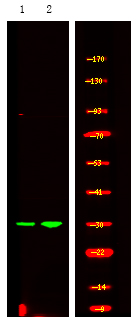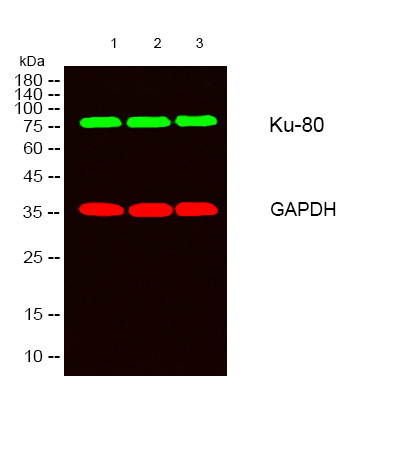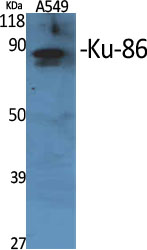PDX1 (Phospho Ser61) rabbit pAb
- Catalog No.:YP1788
- Applications:WB
- Reactivity:Human;Mouse;Rat
- Target:
- PDX1
- Fields:
- >>Insulin secretion;>>Type II diabetes mellitus;>>Maturity onset diabetes of the young
- Gene Name:
- PDX1 IPF1
- Protein Name:
- PDX1 (Phospho-Ser61)
- Human Gene Id:
- 3651
- Human Swiss Prot No:
- P52945
- Mouse Gene Id:
- 18609
- Mouse Swiss Prot No:
- P52946
- Rat Gene Id:
- 29535
- Rat Swiss Prot No:
- P52947
- Immunogen:
- Synthesized peptide derived from human PDX1 (Phospho-Ser61)
- Specificity:
- This antibody detects endogenous levels of PDX1 (Phospho-Ser61) at Human, Mouse,Rat
- Formulation:
- Liquid in PBS containing 50% glycerol, 0.5% BSA and 0.02% sodium azide.
- Source:
- Polyclonal, Rabbit,IgG
- Dilution:
- WB 1:500-2000
- Purification:
- The antibody was affinity-purified from rabbit serum by affinity-chromatography using specific immunogen.
- Concentration:
- 1 mg/ml
- Storage Stability:
- -15°C to -25°C/1 year(Do not lower than -25°C)
- Other Name:
- Pancreas/duodenum homeobox protein 1 (PDX-1) (Glucose-sensitive factor) (GSF) (Insulin promoter factor 1) (IPF-1) (Insulin upstream factor 1) (IUF-1) (Islet/duodenum homeobox-1) (IDX-1) (Somatostatin-transactivating factor 1) (STF-1)
- Molecular Weight(Da):
- 31kD
- Background:
- The protein encoded by this gene is a transcriptional activator of several genes, including insulin, somatostatin, glucokinase, islet amyloid polypeptide, and glucose transporter type 2. The encoded nuclear protein is involved in the early development of the pancreas and plays a major role in glucose-dependent regulation of insulin gene expression. Defects in this gene are a cause of pancreatic agenesis, which can lead to early-onset insulin-dependent diabetes mellitus (NIDDM), as well as maturity onset diabetes of the young type 4 (MODY4). [provided by RefSeq, Jul 2008],
- Function:
- disease:Defects in PDX1 are a cause of pancreatic agenesis [MIM:260370]. This autosomal recessive disorder is characterized by absence or hypoplasia of pancreas, leading to early-onset insulin-dependent diabetes mellitus. This was found in a frameshift mutation that produces a truncated protein and results in a second initiation that produces a second protein that act as a dominant negative mutant.,disease:Defects in PDX1 are the cause of maturity onset diabetes noninsulin-dependent diabetes mellitus (NIDDM) [MIM:125853]; also known as diabetes mellitus type II.,disease:Defects in PDX1 are the cause of maturity onset diabetes of the young type 4 (MODY4) [MIM:606392]; also symbolized MODY-4. MODY [MIM:606391] is a form of diabetes mellitus characterized by an autosomal dominant mode of inheritance, age of onset of 25 years or younger and a primary defect in insulin secretion.,domain:The A
- Subcellular Location:
- Nucleus. Cytoplasm, cytosol .
- Expression:
- Duodenum and pancreas (Langerhans islet beta cells and small subsets of endocrine non-beta-cells, at low levels in acinar cells).
- June 19-2018
- WESTERN IMMUNOBLOTTING PROTOCOL
- June 19-2018
- IMMUNOHISTOCHEMISTRY-PARAFFIN PROTOCOL
- June 19-2018
- IMMUNOFLUORESCENCE PROTOCOL
- September 08-2020
- FLOW-CYTOMEYRT-PROTOCOL
- May 20-2022
- Cell-Based ELISA│解您多样本WB检测之困扰
- July 13-2018
- CELL-BASED-ELISA-PROTOCOL-FOR-ACETYL-PROTEIN
- July 13-2018
- CELL-BASED-ELISA-PROTOCOL-FOR-PHOSPHO-PROTEIN
- July 13-2018
- Antibody-FAQs
- Products Images

- Western Blot analysis of Hela cell,2, LPS 100ng/mL 30min treated ,using primary antibody at 1:1000 dilution. Secondary antibody(catalog#:RS23920) was diluted at 1:10000

